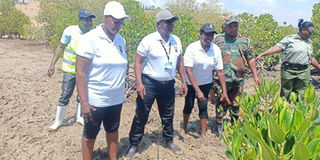Breaking: Autopsy reveals how Cyrus Jirongo died
Kenya Pipeline Company on track as it pursues the sustainability agenda
Sponsored by Kenya Pipeline Company

KPC staff joined the rest of the world in marking this year’s International Day of Forests by planting mangrove trees at Jomvu Creek in Mombasa County.
Kenya Pipeline Company (KPC) management recognises its responsibility to ensure all reasonable steps are taken to protect and preserve the environment it operates in.
Towards this, KPC complies with the Environment Management and Coordination Act 1999 (Cap 387), Occupational Safety and Health Act 2012 (Cap 514), Energy Act 2012 (Cap 314), and Water Act 2016, among other relevant legal frameworks.
KPC has gone beyond compliance with local legislation to commit to international certification in health, safety, and environmental (HSE) management for ISO 14001:2015 Environmental Management Standard; the ISO 45001:2015 on Occupational Health and Safety; ISO 17025 on Laboratory Management, and ISO 9001:2015 on Quality Assurance. These international certifications ensure KPC’s commitment to higher standards over and above the local legislation required in HSE management.
KPC has in place a detailed HSE policy that guides its implementation of related programmes. The policy also includes social performance, in response to the large infrastructure projects the organisation undertakes to ensure it safeguards the communities and towns where Kenya Pipeline operates.
The KPC HSE policy guides the organisation on how to comply with all relevant local legislations and international guidelines, including sustainability considerations in their company operations, and attain continual improvement in their HSE performance.
The vision of KPC’s Safety, Health and Environment Department (SHED) is to achieve world-class safety performance measured as zero fatalities, zero injuries, zero oil spills and zero fires, and a proactive safety culture.
The implementation of the HSE management system in KPC covers four pillars:
- Compliance with the local legislation and industry best practices.
- Prevention of accidents.
- Resource and capability of staff.
- Safety culture.
Under the Prevention pillar, KPC undertakes Hazard and Operability (HAZOP) and Process Safety Audits and Assessments for all its operations, and comes up with control measures to prevent hazards, and mitigation measures to reduce the consequences of possible incidents. As a result, KPC has in place site-specific emergency response plans.
The Resource and Capability Pillar aims to ensure that staff carrying out safety-critical roles are equipped to do their work effectively in a safe manner.
The training provided include, among others, emergency response management and incident command, basic firefighting courses, first aid, incident investigation, HSE committee and environmental sustainability training, bioremediation training, and social impact assessment training.
The culture pillar targets to attain a proactive safety culture. Programmes running under this pillar include participating in the Safety Week and World Environment Day.
KPC commemorated the World Environment Day on June 5, 2022 through tree planting efforts, with 105,000 mangroves tree seedlings planted at Jomvu Kuu Creek in Mombasa County, in partnership with five community forest associations, Kenya Forest Service and Mombasa County Government. To ensure sustainability of the trees, KPC, in liaison with partners, is supporting maintenance programmes for replacement of the damaged seedlings.
KPC management has ensured its involvement in undertaking safety cycles with staff and creating a feedback mechanism is instituted to report near-miss incidents companywide. Furthermore, with increased reporting and close-out action from reported near misses, KPC sites have enhanced safety.
The pipeline company has consistently set aside one percent of its Profit Before Tax in support of Corporate Social Investment (CSI) activities annually. The organisation has set aside resources to give back to society as a way of appreciating, not only the resident communities along the pipeline network, but also other communities across the entire country. As a result, KPC aligned several of its CSI programmes with the government’s agendas, such as Vison 2030, and the Big 4 Agenda, etc.
Over the years, KPC has partnered with various stakeholders, such as the Kenya Forest Service, to help fight climate change through the planting of trees in various counties around the country, and supporting forest adjacent communities to back conservation efforts.
The company has aligned its environmental conservation programme with the Government’s goal of attaining at least 10 percent forest cover across the country in line with the United Nations Sustainable Development Goals. KPC believes this will go a long way in reversing the adverse effects brought about by climate change.
KPC has ensured its adaptation and mitigation programmes on climate change under the stewardship of the National Climate Change Policy have instituted various actions geared at meeting the nationally determined contributions (NDC) aimed at reducing GHG emissions as a country and organisation as per Paris Agreement on climate change. As such, KPC is installing a 150kw solar plant at its headquarters in Nairobi to provide clean energy. The project is envisaged to be completed by December 2022.
To further mitigate against operational GHG emissions, KPC has been retrofitting its spirit product tanks from single floating roof type to dome roof, with floating roof 1No 11TK201 converted in 2021. Plans are underway to retrofit tanks 14TK201, 14TK501, and 502 within FY 2021/22/23. In addition, all tanks constructed since 2016 after the Climate Change Act came into force, have been dome roofed with higher efficiency in curbing fugitive emissions from the storage tanks.
KPC has also invested in low-carbon energy efficiency technologies through installation of Variable Frequency Drive (VFD) that limits the energy consumption of the mainline pump, i.e., energy efficiency meters, whose investment costs will be recouped overtime through green climate funding grants and carbon credit sales for GHGs avoidance under Kyoto Protocol. This has achieved an energy saving of 97,194,359.26Kwh per annum, resulting in reduction of 52,1933 CO2 emissions and a cost saving of Ksh875,999,807.43 per annum as per the latest Energy Audit of KPC facilities.
This achievement clearly shows KPC has been an industry leader in climate change policies implementation in the country, and a pillar in the United Nations Framework Convention on Climate Change, with its annual participation in the negotiation exercises.


